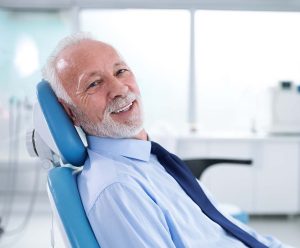Oral Cancer Screenings: Early Detection Saves Lives
Oral cancer is a serious disease that can affect any of the soft tissues in the mouth and quickly spread throughout the rest of the body because of the mouth’s proximity to lymph nodes. An oral cancer screening at our Seaford or Wilmington, DE, locations can help doctors diagnose the disease in its earliest stages when it’s most easily treatable.
At Brown and Baran Family Dentistry, Drs. Paul E. Brown and Christopher S. Baran use meticulous techniques to perform highly accurate oral cancer screenings, in which the smallest tissue irregularities may be detected. This important exam could save your life.
To schedule your oral cancer screening, contact our Wilmington, DE, dental office at (302) 999-7600 or our Seaford, DE, dental office at (302) 536-7589. We proudly welcome patients from Wilmington, Seaford, and the surrounding Delaware areas.
What Is Oral Cancer?
Oral cancer is a type of cancer that affects the mouth, throat, tongue, and lips. According to the American Cancer Society, about 54,000 people in the United States are diagnosed with oral cancer each year, and it causes about 10,000 deaths annually. However, with regular oral cancer screenings, the chances of detecting the disease in its early stages and successfully treating it are significantly increased.

Signs and Symptoms of Oral Cancer
One of the reasons oral cancer is so deadly is that it often goes undetected until it has advanced. Therefore, it’s important to know the signs and symptoms of oral cancer and seek medical attention if you experience any of them. Common signs and symptoms of oral cancer include:
- Mouth sores that don’t heal
- Red or white patches in the mouth
- A lump or thickening in the mouth or throat
- Difficulty or pain when swallowing
- Numbness or tingling in the mouth or tongue
- A persistent sore throat or hoarseness
- Swelling of the jaw
Self-Screening for Oral Cancer in Wilmington and Seaford Near You
You can also perform a self-examination to check for signs of oral cancer. Use a bright light and a mirror to check the inside of your mouth, tongue, and throat. Look for any abnormal growths, bumps, or sores. You should also feel your neck and throat for any lumps or tenderness. If you believe you have signs of oral cancer, you should schedule a screening at one of our dental offices in Delaware for an accurate diagnosis.
Why Choose Us for Oral Cancer Screenings in Wilmington & Seaford, DE
Early detection saves lives—that’s why our Delaware dental practices prioritize comprehensive oral cancer screenings with every exam. At our Wilmington and Seaford locations, Dr. Brown and Dr. Baran use advanced VELscope® technology that detects suspicious tissue changes often missed by the naked eye. Unlike basic visual exams offered elsewhere, our thorough screening process examines all oral tissues, including under the tongue and throat areas, where early signs frequently develop.
With convenient screening appointments available at both our New Castle and Sussex County dental offices, our experienced Delaware dental team provides this potentially life-saving service as part of your regular preventive care. Choose us for painless, quick oral cancer screenings near you that offer peace of mind and potentially life-saving early detection.
Types of Oral Cancer Screenings
There are several types of oral cancer screenings, including visual screening, physical exam, biopsy, imaging tests, salivary diagnostics, and molecular testing.
- During a visual screening, a healthcare professional will examine your mouth for any abnormal growths or sores.
- During a physical exam, they will feel your neck and throat for any lumps or tenderness.
- Biopsies involve taking a tissue sample from the abnormal area to be tested for cancer.
- Imaging tests, such as X-rays and CT scans, can help detect any abnormalities in the mouth or throat.
- Salivary diagnostics and molecular testing can detect early signs of oral cancer by analyzing saliva samples or testing for specific biomarkers.

What Happens During an Oral Cancer Screening?
Your oral cancer screening will typically occur at the same time as your routine dental exam and cleaning. However, if you notice any worrisome symptoms, you should contact us immediately. During your screening, your dentist will visually check for any oral cancer symptoms as listed above. Your dentist may also check for other signs and symptoms such as:
- Bleeding
- Jaw stiffness
- Tongue stiffness or pain
- Ear pain
- Changes in the way your dentures fit
- Unexplained weight loss
If your dentist detects any sores or lesions, he will order a biopsy. After he takes a small tissue sample, a trusted lab will analyze it to provide a definitive diagnosis.
Often, mouth sores turn out to be harmless, or they may be a symptom of a less serious condition, such as gum disease. However, if you do have cancer, we’ll work alongside your treatment team to ensure compassionate, effective, and comprehensive care.
Why Are Oral Cancer Screenings So Important?
According to the American Cancer Society, an estimated 54,010 people in the United States will be diagnosed with oral cancer in 2023, and 10,850 people will die from the disease.
In its early stages, oral cancer doesn’t usually produce noticeable symptoms. Therefore, patients may go undiagnosed until the disease has already spread. This is why it’s so vital that you receive regular screenings.
Our dentists can identify the earliest possible symptoms so that you can receive lifesaving treatment while the cancer is still localized. Early detection of oral cancer increases the chances of successful treatment and survival. Therefore, it’s important to stay informed about the signs and symptoms of oral cancer, perform self-examinations, and receive regular screenings from your healthcare professional. By taking proactive steps to protect ourselves against oral cancer, we can reduce the mortality rate and save lives.
Frequently Asked Questions
We recommend oral cancer screenings as part of your regular dental checkups, typically every six months. However, for patients with higher risk factors (tobacco users, heavy alcohol consumers, previous oral cancer diagnosis, or HPV infection), Dr. Brown or Dr. Baran may recommend more frequent screenings. Our goal is to provide personalized care based on your specific health needs at both our Wilmington and Seaford locations.
Most Delaware insurance plans cover oral cancer screenings as part of your routine dental examination. Our helpful administrative staff at Brown and Baran Family Dentistry can verify your coverage before your appointment and discuss any potential out-of-pocket costs. We believe preventive care is essential and work to make these screenings accessible to all our Delaware patients.
To reduce your risk of oral cancer:
- Quit tobacco in all forms (Delaware Quitline offers free resources: 1 (866) 409-1858)
- Limit alcohol consumption
- Use sun protection on your lips when enjoying Delaware’s beaches and outdoor activities
- Maintain good oral hygiene
- Keep regular appointments with Brown and Baran Family Dentistry for professional cleanings and screenings
- Eat a balanced diet rich in fruits and vegetables
- Consider HPV vaccination (discuss with your primary care provider)
For more information about oral cancer screenings or to schedule an appointment, contact Brown and Baran Family Dentistry at our Wilmington dental office at (302) 999-7600 or our Seaford dental office at (302) 536-7589.
Protect Yourself Against Oral Cancer. Call Us Today!
Schedule an oral cancer screening at one of our locations today to protect yourself against oral cancer. Schedule an appointment by calling our Wilmington, DE office at (302) 999-7600 or our Seaford, DE office at (302) 536-7589. You can also fill out our contact form, and our team will get back to you shortly.
Don’t wait until it’s too late – early detection is key to successful treatment and survival. We proudly serve new and returning patients throughout Delaware and its surrounding areas.

